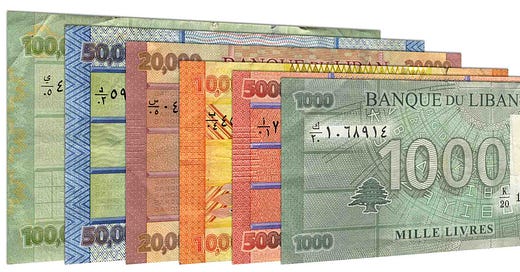Spending a month living in Beirut, Lebanon has been an eye-opening experience for me.
This is a country on the ongoing brink of total economic collapse. The currency has become devalued to one fiftieth of its value four years ago, including a 30% drop during the few weeks that I’ve been here.
Debit cards are useless as the banking system refuses to accept the actual exchange rate to the US dollar, meaning you will get charged many times the cost.
There is no subway or metro system, and local buses are falling apart and sporadic, meaning most citizens still travel in cars, which they increasingly can’t afford to fuel.
Banks have been ongoingly refusing to let clients have their savings, “bailing them in” to save their own skin.
The electric grid can only be relied upon to provide power for at best an hour or two a day. Thus, pretty much all buildings have electricity from petrol-fired generators. These generators and their maintenance is in the hands of the popularly-named “generator mafia” - gangs who supply them and who occasionally fight turf wars over a particularly juicy area.
Water needs to be pumped electrically, meaning its supply is also dependent on generators.
The President resigned last year and no one has taken his place.
Heaps of citizens no longer go into work as they can’t afford to commute.
The government openly admits that it has no plan to deal with the situation, and expends no little energy walling itself off from criticism or rebellion.
To date, no one has been found liable for the Beirut port explosion in 2020, all attempts to investigate having been suppressed at higher levels.
By Western standards, the country seems pretty much devastated.
However, Beirutees themselves, whilst clearly struggling and frequently enraged, also show remarkable resilience. The crime rate remains low and there is a sense that they all are on some kind of out-of-control fairground ride and that this is just how it is. Black humour prevails.
Something that has stood out for me, in my meetings with local citizens, is the incredible prevalence of conspiracy theories. I haven’t done any kind of scientific survey but I hear all sorts of them from guides, taxi-drivers and regular citizens.
Noting this rung a bell in my mind.
It’s often been proposed that believing in any kind of organising or overseeing agency, even one that is utterly malign, is preferable to believing that no one actually knows what’s going on or has any clue what to do.
We seem to be configured to prefer malign agency over total chaos.
This has been one learning for me, spending time in this incredible city.




I was thinking about GOD - ie the idea of god the other day . I realized that god is the entire part of reality that is not self , then , god is the mystical magical miracle , the lightening strike that penetrates reality from no where , unasked for . After that , god has a third aspect which is growing self knowing and in that , relational . The first god is mysterious and distant , the lightening bolt god is energetic and all powerful and the third kind of story is relational and balanced , and creates deep security and peace . I think in people who believe in government , ( I believe in god way before I believe in governmental leadership ) they are going to experience one of these relationships with their government / non government . In a way , it sounds like that peacefullness has arrived inside of the elimination of the first two gods , and that is creating good humor , laughter , and truly human experience . ( Which is what we are here to be ! )
Cripes, looks precarious. Especially with with Ukraine and Russian oil/grain going offline. I hear Egypt similarly precarious position. We have heard about inflation in Turkey but no general awareness (if I am typical) of the precarious state of the Middle East (including Afghanistan and Iran). Feels like implosion impending.
Good fieldwork, btw!